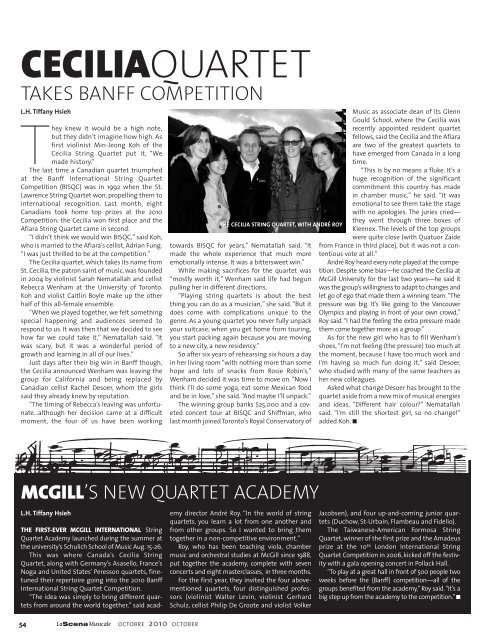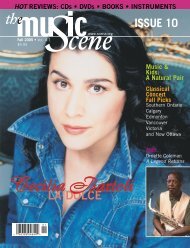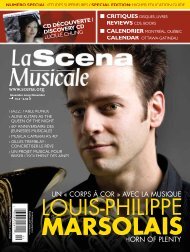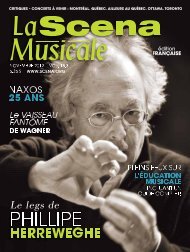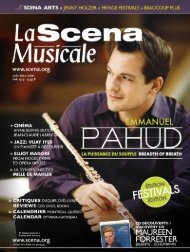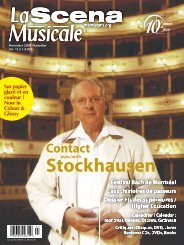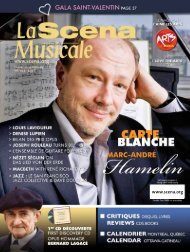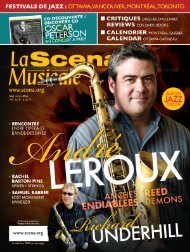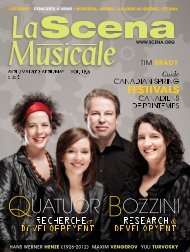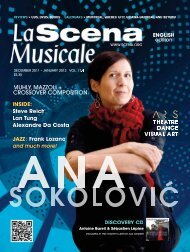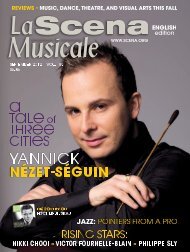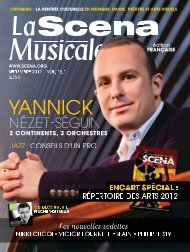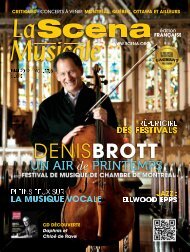You also want an ePaper? Increase the reach of your titles
YUMPU automatically turns print PDFs into web optimized ePapers that Google loves.
CECILIAQUARTET<br />
TAKES BANFF COMPETITION<br />
L.H. Tiffany Hsieh<br />
They knew it would be a high note,<br />
but they didn’t imagine how high. As<br />
first violinist Min-Jeong Koh of the<br />
Cecilia String Quartet put it, “We<br />
made history.”<br />
The last time a Canadian quartet triumphed<br />
at the Banff International String Quartet<br />
Competition (BISQC) was in 1992 when the St.<br />
<strong>La</strong>wrence String Quartet won, propelling them to<br />
international recognition. <strong>La</strong>st month, eight<br />
Canadians took home top prizes at the <strong>2010</strong><br />
Competition: the Cecilia won first place and the<br />
Afiara String Quartet came in second.<br />
“I didn’t think we would win BISQC,” said Koh,<br />
who is married to the Afiara’s cellist, Adrian Fung.<br />
“I was just thrilled to be at the competition.”<br />
The Cecilia quartet, which takes its name from<br />
St. Cecilia, the patron saint of music, was founded<br />
in 2004 by violinist Sarah Nematallah and cellist<br />
Rebecca Wenham at the University of Toronto.<br />
Koh and violist Caitlin Boyle make up the other<br />
half of this all-female ensemble.<br />
“When we played together, we felt something<br />
special happening and audiences seemed to<br />
respond to us. It was then that we decided to see<br />
how far we could take it,” Nematallah said. “It<br />
was scary, but it was a wonderful period of<br />
growth and learning in all of our lives.”<br />
Just days after their big win in Banff though,<br />
the Cecilia announced Wenham was leaving the<br />
group for California and being replaced by<br />
Canadian cellist Rachel Desoer, whom the girls<br />
said they already knew by reputation.<br />
“The timing of Rebecca’s leaving was unfortunate…although<br />
her decision came at a difficult<br />
moment, the four of us have been working<br />
THE CECILIA STRING QUARTET, WITH ANDRÉ ROY<br />
towards BISQC for years,” Nematallah said. “It<br />
made the whole experience that much more<br />
emotionally intense. It was a bittersweet win.”<br />
While making sacrifices for the quartet was<br />
“mostly worth it,” Wenham said life had begun<br />
pulling her in different directions.<br />
“Playing string quartets is about the best<br />
thing you can do as a musician,” she said. “But it<br />
does come with complications unique to the<br />
genre. As a young quartet you never fully unpack<br />
your suitcase; when you get home from touring,<br />
you start packing again because you are moving<br />
to a new city, a new residency.”<br />
So after six years of rehearsing six hours a day<br />
in her living room “with nothing more than some<br />
hope and lots of snacks from Rosie Robin’s,”<br />
Wenham decided it was time to move on. “Now I<br />
think I’ll do some yoga, eat some Mexican food<br />
and be in love,” she said. “And maybe I’ll unpack.”<br />
The winning group banks $25,000 and a coveted<br />
concert tour at BISQC and Shiffman, who<br />
last month joined Toronto’s Royal Conservatory of<br />
Music as associate dean of its Glenn<br />
Gould School, where the Cecilia was<br />
recently appointed resident quartet<br />
fellows, said the Cecilia and the Afiara<br />
are two of the greatest quartets to<br />
have emerged from Canada in a long<br />
time.<br />
“This is by no means a fluke. It’s a<br />
huge recognition of the significant<br />
commitment this country has made<br />
in chamber music,” he said. “It was<br />
emotional to see them take the stage<br />
with no apologies. The juries cried—<br />
they went through three boxes of<br />
Kleenex. The levels of the top groups<br />
were quite close (with Quatuor Zaide<br />
from France in third place), but it was not a contentious<br />
vote at all.”<br />
André Roy heard every note played at the competition.<br />
Despite some bias—he coached the Cecilia at<br />
McGill University for the last two years—he said it<br />
was the group’s willingness to adapt to changes and<br />
let go of ego that made them a winning team. “The<br />
pressure was big. It’s like going to the Vancouver<br />
Olympics and playing in front of your own crowd,”<br />
Roy said. “I had the feeling the extra pressure made<br />
them come together more as a group.”<br />
As for the new girl who has to fill Wenham’s<br />
shoes, “I’m not feeling (the pressure) too much at<br />
the moment, because I have too much work and<br />
I’m having so much fun doing it,” said Desoer,<br />
who studied with many of the same teachers as<br />
her new colleagues.<br />
Asked what change Desoer has brought to the<br />
quartet aside from a new mix of musical energies<br />
and ideas, “Different hair colour?” Nematallah<br />
said. “I’m still the shortest girl, so no change!”<br />
added Koh. ■<br />
MCGILL’S NEW QUARTET ACADEMY<br />
L.H. Tiffany Hsieh<br />
THE FIRST-EVER MCGILL INTERNATIONAL String<br />
Quartet Academy launched during the summer at<br />
the university’s Schulich School of Music Aug. 15-26.<br />
This was where Canada’s Cecilia String<br />
Quartet, along with Germany’s Asasello, France’s<br />
Noga and United States’ Peresson quartets, finetuned<br />
their repertoire going into the <strong>2010</strong> Banff<br />
International String Quartet Competition.<br />
“The idea was simply to bring different quartets<br />
from around the world together,” said academy<br />
director André Roy. “In the world of string<br />
quartets, you learn a lot from one another and<br />
from other groups. So I wanted to bring them<br />
together in a non-competitive environment.”<br />
Roy, who has been teaching viola, chamber<br />
music and orchestral studies at McGill since 1988,<br />
put together the academy, complete with seven<br />
concerts and eight masterclasses, in three months.<br />
For the first year, they invited the four abovementioned<br />
quartets, four distinguished professors<br />
(violinist Walter Levin, violinist Gerhard<br />
Schulz, cellist Philip De Groote and violist Volker<br />
Jacobsen), and four up-and-coming junior quartets<br />
(Duchow, St-Urbain, Flambeau and Fidelio).<br />
The Taiwanese-American Formosa String<br />
Quartet, winner of the first prize and the Amadeus<br />
prize at the 10 th London International String<br />
Quartet Competition in 2006, kicked off the festivity<br />
with a gala opening concert in Pollack Hall.<br />
“To play at a great hall in front of 500 people two<br />
weeks before the (Banff) competition—all of the<br />
groups benefited from the academy,” Roy said. “It’s a<br />
big step up from the academy to the competition.” ■<br />
54 OCTOBRE <strong>2010</strong> OCTOBER


